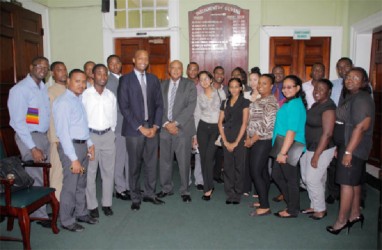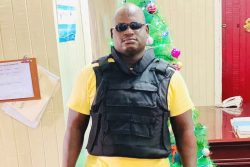Saying that power needs to be returned to the people, House Speaker Raphael Trotman yesterday sounded a call for “real decision making” to begin at the community-level.
“We have to change our decision-making policies…there should be an inclusive form of governance in Guyana and decision-making processes so that all the different factors and sectors of our society should be factored into the decision-making,” he said during a meeting with members of the new Blue CAPS non-governmental organisation at the Public Buildings yesterday.
“I believe that the real decision-making should be made at the bottom. So, we need to devolve more power to the people at the local government level. A community in Ann’s Grove or a community in Tain, Corentyne shouldn’t have to wait for a minister to say that a bridge should be built… that should be left to the people; they know best for themselves,” he added.
Trotman further stated that Parliament should instead focus on the national issues and leave the basic issues to the Guyanese citizens, especially willing youths such as those that had been in attendance.
“I’d like to see the power given back to the people. There is too much power centred around Parliament,” he noted. “The real power should go the peoples of Guyana and the more national aspects should be left to Parliament.”
Trotman congratulated the youths for their initiative and urged them to take control despite adversity and temptation.

“The most important thing is to define yourselves and not let anyone define you. The minute you can do that, you become a valuable asset and tool to the nation,” he said.
He continued, “I really want to commend you because we have not had a group of young people in recent times – and so many of you – coming forth on behalf of Guyana and that is something I believe has to be celebrated.”
However, he warned them of the inevitable backlash. “You are going to take knocks for it…the fact that you are already getting attacks is like a blade of grass pushing out of the ground; it means it gets noticed and it’s going to come under attack; that means you are a threat to someone.”
Yesterday’s meeting was part of Blue CAPS’ month-long exercises to build youth leadership in Guyana.
Leadership crisis
In the Parliament Chambers yesterday, Presi-dent and Founder of Blue CAPS Clinton Urling explained that the organisation was developed as a result of the recognition of a leadership crisis in society. “We can see it happening where our leaders at the political level–the highest level–our leaders can’t compromise, can’t negotiate,” he said.
He opined that the absence of local government elections for the past 20 years has played a part in the problem. “That translates into a leadership vacuum in communities, where young people see no opportunity to run their communities,” he said.
The objective of his organisation is to show young people that leadership can come from anywhere. “If you’re a part of a system, if you’re a part of the community or any network, you can demonstrate leadership,” he said. “Every single one of us.”
He added that Blue CAPS aimed to develop current leaders, form public policy subscriptions and instil the belief and attitude of service.
He mentioned that the group has been accused of linkages to specific political parties. However, he pointed out that the members of Blue CAPS are from several organisations that came together under its “Building of Communi-ties through Leadership Training Service” programme.
The initiative is a month-long forum which exposes the young leaders to the country’s leaders. Affiliated organisations include the Rasville/ Roxanne Burnham Com-munity Group, the Global Movement Guyana, the Society Against Sexual Orientation Discrimination (SASOD), the Youth Action Network, and the Youth Ambassadors Program.
“We believe strongly that collective action is more dynamic and more purposeful than individual action,” Urling emphasised.
He added, “The intention is to create a network. If our most valuable resource is the young people, it is important we have a network of leaders of most of the youth-based organisations together.”
The initiative comprises of two main components; the first is a classroom-like curriculum style where “cutting edge” theories on leadership are taught to members in an attempt to sharpen their communication skills and allow them to engage in critical and analytical thinking.
The second component involves a “Youth Exper-ience Service” aspect which encompasses community participation. Last week, the organisation did a community survey of three communities which have yielded results in at least one of the selected communities. The community, the Rasville/ Roxanne Burnham Gardens area, has begun forming its own youth organization.
After the survey, Urling said, small-scale youth projects were developed with eventual implementation. The aim was for members of the Blue CAPS to use their creativity and demonstrate leadership and to develop solutions to community-based problems.
“This initiative is just the first we’re starting in Georgetown and the intention is to go nationally across the country,” he said.










